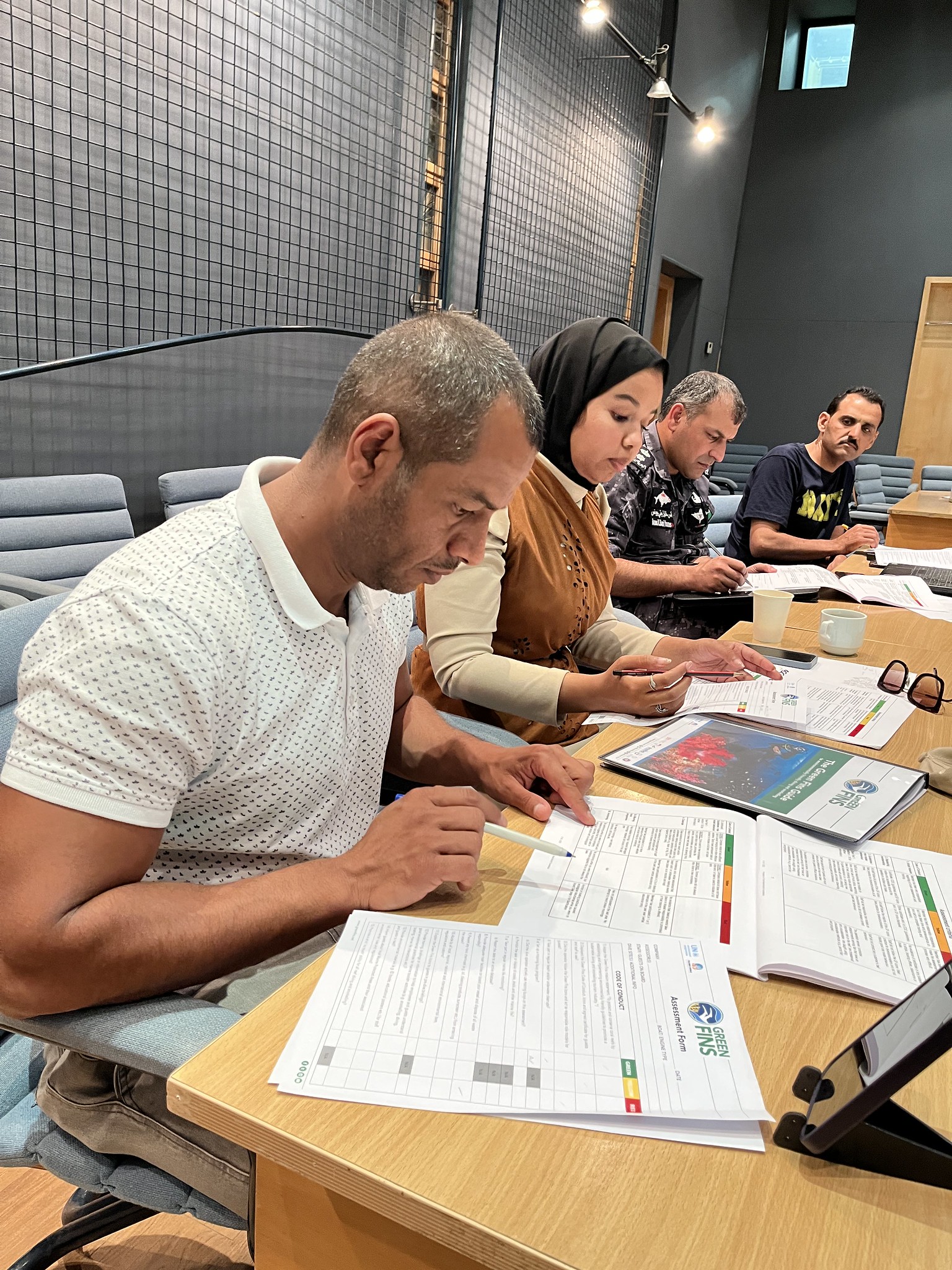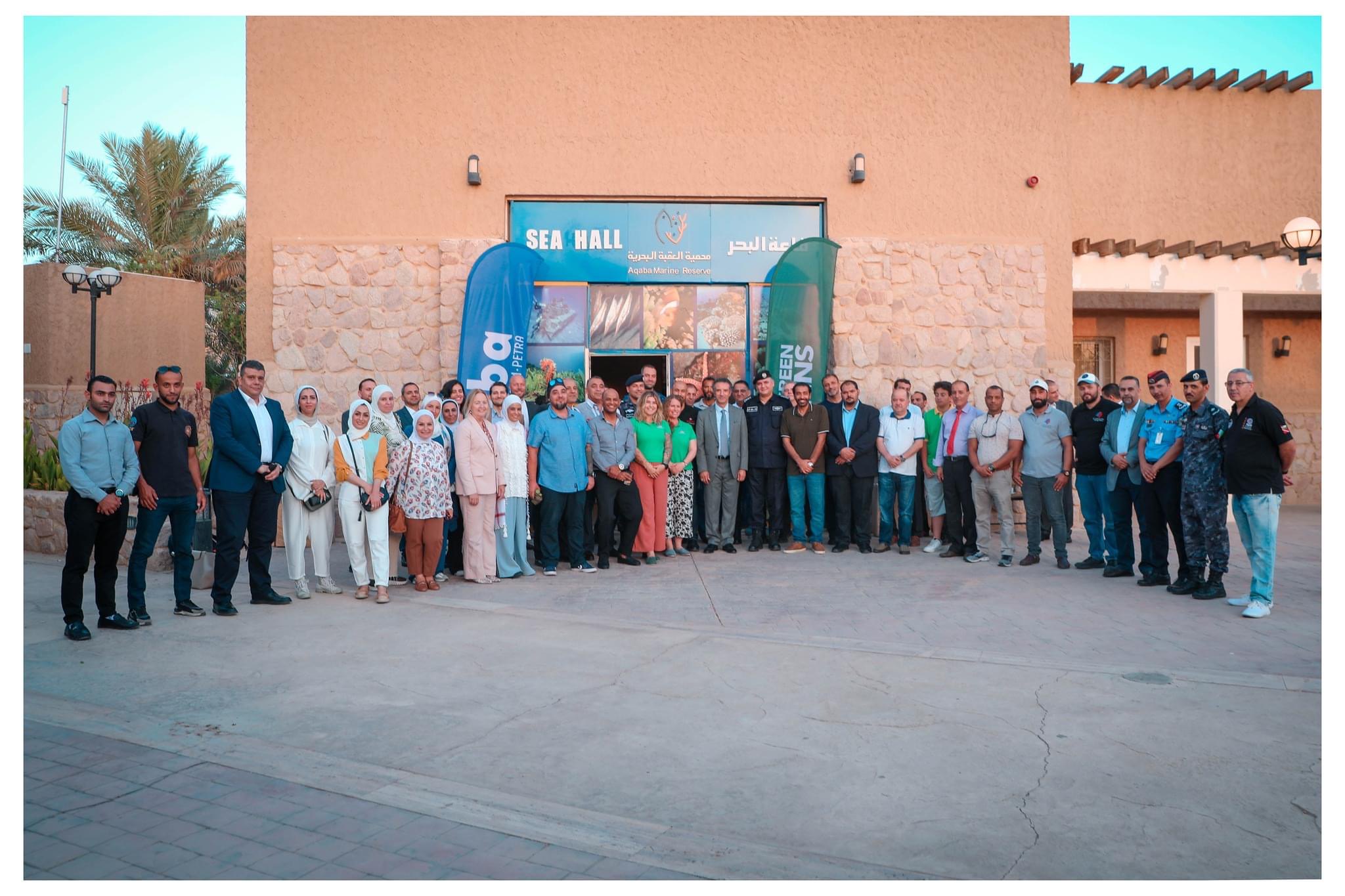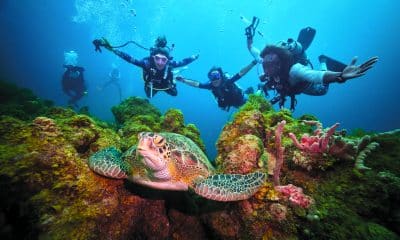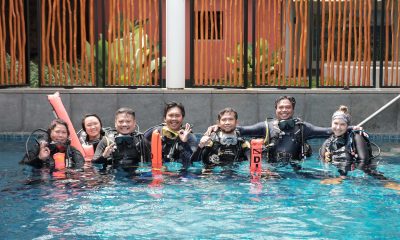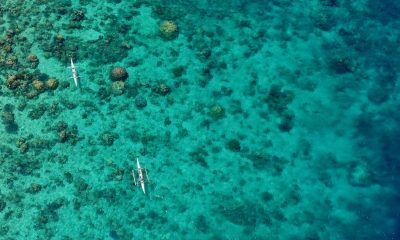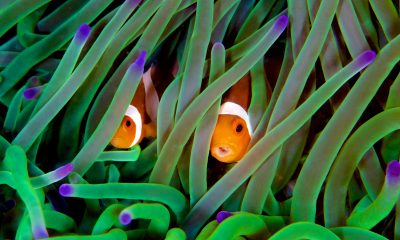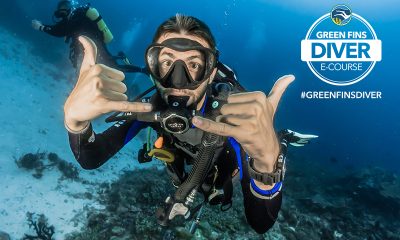Marine Life & Conservation
Green Fins launches in Jordan

The Reef-World Foundation is delighted to announce that Jordan is now the 15th country globally to implement the Green Fins programme — a UN Environment Programme initiative. The programme’s launch in Aqaba is evidence of Jordan’s commitment to safeguarding its natural resources and promoting sustainable tourism as the country builds its reputation as a world-class diving destination.
Green Fins is implemented in the country by Aqaba Special Economy Zone Authority (ASEZA) with the support of the Deutsche Gesellschaft fur Internationale Zusammenarbeit (GIZ) through the “Employment-oriented MSME promotion” project on behalf of the German Federal Ministry for Economic Cooperation and Development (BMZ), with the ultimate aim of improving the communication of environmental best practice from local diving centres to environmentally conscious tourists to help protect the environment.
Dominik Lee Zaax Wyszogrodzki, Green Fins Local Team Leader, said: “Divers are willing to pay more for services provided by dive centres that follow environmental regulations, and they expect dive centres to be leading the way in protecting the ocean. Implementing Green Fins in Aqaba is going to open us up to new markets and bring us to be one of the top diving destinations in the world.”
Following a week of training by an all-female-led training team from Reef-World (10 to 15 June 2023), Jordan now has a national Green Fins team comprised of five fully certified Green Fins Assessors and two Green Fins Coordinators from representatives of the Royal Jordanian Navy Forces, Aqaba Marine Reserve and the University of Jordan made up of a diverse group of local diving experts, environmentalists, and industry leaders. The Green Fins Jordan team is led by Ms Thelma Redwan, the Product Director at ASEZA, who coordinates the programme in collaboration with The Reef-World Foundation, GIZ, and other stakeholders.
The newly established local Green Fins team will be responsible for recruiting, assessing, training and certifying dive and snorkel operators to become Green Fins Members in the country. This involves providing training about the ecology and threats to coral reefs, advice for adopting simple and practical solutions to these threats and guidance to the Green Fins’ environmental standards for dive and snorkel operators. Green Fins membership will help marine tourism operators identify priority areas to improve their business sustainability performance and communicate their commitment to following environmental best practices as a way of attracting eco-minded tourists.
“I’m thrilled to welcome Jordan to the Green Fins network as the fifteenth country to adopt the initiative to secure the future sustainability of their marine tourism industry,” said Chloe Harvey, Executive Director of The Reef-World Foundation. “ASEZA has shown exceptional leadership in recognising the opportunity to establish best environmental practice among their diving community with Green Fins. Jordan is a unique diving destination and home to a bountiful array of marine life. Our coral reefs are in serious trouble; it’s possible that coral reefs globally could be lost in our lifetime. Reducing local, direct threats to coral reefs, such as those posed by diving and snorkelling activities, will significantly improve their chance of survival.”
Diving and snorkelling-related damage to sensitive marine ecosystems, including coral reefs, is becoming an increasingly significant issue. This damage makes them less likely to survive other local and wider threats, such as those associated with overfishing or plastic debris and the effects of climate change. Based on robust individual assessments of business practices, the Green Fins initiative helps identify high-risk activities. The assessors then work with participating business leaders to build and commit to a tailored sustainability action plan to address these risks. Through Green Fins implementation in Jordan, Reef-World aims to improve the sustainability of the diving industry in the region by working with 15 marine tourism operators, training 75 dive guides and raising awareness of sustainability best practices among 15,000 tourists in the first year of implementation.
Abdullah, Manager at Red Sea Dive Center, said: “I signed up for the Green Fins membership and got the help and support of the Green Fins team. I saw how thorough the process was and all the things they do on the assessment day. Now I’m convinced it’s an amazing programme that could really help the environment and one I’m very proud to be part of!”
Green Fins is a UN Environment Programme initiative, internationally coordinated by The Reef-World Foundation, which aims to protect and conserve coral reefs through environmentally friendly guidelines to promote a sustainable diving and snorkelling tourism industry. Green Fins provides the only internationally recognised environmental standards for the diving and snorkelling industry and has a robust assessment system to measure compliance.
To date, four dive operators in Aqaba have joined the global network of 700+ trained and assessed Green Fins Members. These are: Aqaba Adventure Divers, Arab Divers, Coral Garden Diving Center and Red Sea Dive Center.
For more information, please visit www.reef-world.org or www.greenfins.net/countries/jordan. Dive and snorkel operators in Jordan interested in becoming Green Fins Members can sign up at: www.greenfins.net/register or contact the team at jordan@greenfins.net.
Blogs
Invitation from The Ocean Cleanup for San Francisco port call

6 years ago, The Ocean Cleanup set sail for the Great Pacific Garbage Patch with one goal: to develop the technology to be able to relegate the patch to the history books. On 6 September 2024, The Ocean Cleanup fleet returns to San Francisco bringing with it System 03 to announce the next phase of the cleanup of the Great Pacific Garbage Patch and to offer you a chance to view our cleanup system up-close and personal.
We look forward to seeing you there.
To confirm your presence, please RSVP to press@theoceancleanup.com
PROGRAM
Join The Ocean Cleanup as our two iconic ships and the extraction System 03 return to San Francisco, 6 years and over 100 extractions after we set sail, to create and validate the technology needed to rid the oceans of plastic.
Our founder and CEO, Boyan Slat, will announce the next steps for the cleanup of the Great Pacific Garbage Patch. Giving you a chance to view our cleanup system and the plastic extracted.
Hear important news on what’s next in the mission of The Ocean Cleanup as it seeks to make its mission of ridding the world’s oceans of plastic an achievable and realistic goal.
Interviews and vessel tours are available on request.
PRACTICALITIES
Date: September 6, 2024
Press conference: 12 pm (noon)
Location: The Exploratorium (Google Maps)
Pier 15 (Embarcadero at Green Street), San Francisco, CA
Parking: Visit The Exploratorium’s website for details.
RSVP: press@theoceancleanup.com
Video & photo material from several viewing spots around the bay
We look forward to seeing you there!
ABOUT THE OCEAN CLEANUP
The Ocean Cleanup is an international non-profit that develops and scales technologies to rid the world’s oceans of plastic. They aim to achieve this goal through a dual strategy: intercepting in rivers to stop the flow and cleaning up what has already accumulated in the ocean. For the latter, The Ocean Cleanup develops and deploys large-scale systems to efficiently concentrate the plastic for periodic removal. This plastic is tracked and traced to certify claims of origin when recycling it into new products. To curb the tide via rivers, The Ocean Cleanup has developed Interceptor™ Solutions to halt and extract riverine plastic before it reaches the ocean. As of June 2024, the non-profit has collected over 12 million kilograms (26.4 million pounds) of plastic from aquatic ecosystems around the world. Founded in 2013 by Boyan Slat, The Ocean Cleanup now employs a broadly multi-disciplined team of approximately 140. The foundation is headquartered in Rotterdam, the Netherlands, and opened its first regional office in Kuala Lumpur, Malaysia, in 2023.
Find out more about The Ocean Cleanup at www.theoceancleanup.com.
Marine Life & Conservation
SHARK MONTH ARRIVES AT ROYAL WILLIAM YARD, PLYMOUTH

A shark has been spotted approaching Royal William Yard in Plymouth, much to the surprise of swimmers, paddleboarders and onlookers.
With its distinctive dorsal fin cutting through the water, the sizeable shark swam along the coastline, before turning to head inland towards Firestone Arch at Royal William Yard. The appearance drew a crowd, who were captivated for more than an hour by the unusual sight – and it was all caught on video.
The shark is one of many expected sightings at Royal William Yard over the coming weeks… because today marks the start of Shark Month!
In reality, the ‘shark’ spotted along the Plymouth shoreline was actually a custom-made model, created by the team at Royal William Yard and sailed underwater by Caroline Robertson‑Brown from the Shark Trust, who donned scuba diving gear for the occasion.
The stunt took place to launch Shark Month in style and draw attention to the work of the leading international conservation charity, which is based in Britain’s Ocean City. Spectators were reassured that the water was safe and many entered into the spirit of the performance, swimming or sailing alongside the shark.
Shark Month will take place across Royal William Yard throughout July and will feature an extravaganza of art, entertainment and advocacy for everyone to enjoy. The packed programme of events starts with an art exhibition and ends with a trip on paddleboards with shark experts – with everything from a shark quiz to a Jaws screening in between.
Paul Cox, CEO of the Shark Trust, said: “There are often assumptions and misconceptions when it comes to sharks. This was certainly the case with the shark spotted at Royal William Yard! While the British coastline is home to many species of shark, this was not one of them. However, we’re thrilled it caught people’s attention, because seeing a shark is a special and memorable moment. That is precisely why we want to celebrate these incredible creatures, highlight the need for conservation, and ask for help to safeguard their future.”
For more information about Shark Month at Royal William Yard, visit the Shark Trust Website.
Images and video: Jay Stone
-

 Blogs2 months ago
Blogs2 months agoDiving With… Nico, Ocean Earth Travels, Indonesia
-

 News1 month ago
News1 month agoMurex Bangka Announce New Oceanfront Cottages & Beachfront Dining
-

 Blogs2 months ago
Blogs2 months agoA new idea in freediving from RAID
-

 Marine Life & Conservation1 month ago
Marine Life & Conservation1 month agoIceland issue millionaire whale hunter a licence to murder 128 vulnerable fin whales
-

 Marine Life & Conservation2 months ago
Marine Life & Conservation2 months agoThe Shark Trust Great Shark Snapshot is back
-

 News3 months ago
News3 months agoCharting New Waters; NovoScuba Goes Global with the Launch of their Revolutionary Dive Training Agency!
-

 Gear News1 month ago
Gear News1 month agoNew Suunto Ocean – a dive computer and GPS sports watch in one for adventures below and above the surface
-

 Marine Life & Conservation Blogs2 months ago
Marine Life & Conservation Blogs2 months agoBook Review: Plankton


